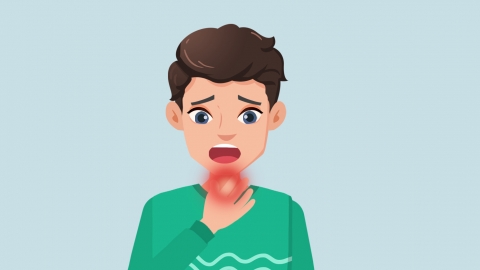What should I do if I have a cold, persistent cough, and sore throat?
Generally speaking, the throat refers to the pharynx. Sore throat and cough caused by a cold may be due to dry air, excessive voice use, acute pharyngitis, acute tonsillitis, acute bronchitis, or other reasons. It is recommended to seek timely medical attention, under whose guidance general treatments and medications may be used. Detailed explanations are as follows:

1. Dry Air
In dry environments, moisture from the respiratory mucosa is rapidly lost, causing the mucous membranes to lose their natural moisture and elasticity. This not only stimulates nerve endings in the throat, causing pain, but also impairs the ciliary movement in the respiratory tract, reducing its ability to effectively clear secretions and foreign substances, thereby irritating the airway and causing coughing. Using a humidifier indoors to maintain humidity between 40%-60%, and regularly opening windows for ventilation to ensure air circulation are recommended.
2. Excessive Voice Use
During a cold, the body's immunity is reduced, and the mucous membranes of the throat are relatively fragile. If one speaks loudly for prolonged periods or sings for extended durations, throat muscles remain tense, causing congestion and swelling of the throat mucosa, which leads to throat pain and easily irritates the airway, causing coughing. It is advisable to minimize voice use during a cold and avoid prolonged continuous vocalization to allow the throat adequate rest.
3. Acute Pharyngitis
Acute pharyngitis is usually caused by viral infections, such as Coxsackievirus, adenovirus, and occasionally bacterial infections. Viruses or bacteria invading the throat cause an inflammatory response, leading to congestion and swelling of the pharyngeal mucosa. Stimulated sensory nerve endings result in pain symptoms. Inflammatory irritation of the respiratory mucosa leads to increased secretions, causing coughing. Symptoms such as dryness and itching in the throat may also occur. Medications such as Cefadroxil Granules, Amoxicillin Capsules, Roxithromycin Dispersible Tablets may be used under a doctor's guidance.
4. Acute Tonsillitis
Acute tonsillitis is mainly caused by pathogenic bacteria such as Group A beta-hemolytic streptococcus, Staphylococcus aureus, Streptococcus pneumoniae, etc. Bacteria multiply extensively within the tonsils, triggering inflammation that causes redness and swelling of the tonsils and inflammatory edema in surrounding tissues, stimulating nerve endings and causing throat pain and coughing. Symptoms such as difficulty swallowing and fever may also appear. Patients may follow medical advice to use medications such as Cefprozil Tablets, Levofloxacin Tablets, Metronidazole Tablets for treatment.
5. Acute Bronchitis
Acute bronchitis is often caused by viral or bacterial infections, but may also be triggered by inhaling allergens or irritating gases. Inflammation occurs in the bronchi, causing congestion and swelling of the bronchial mucosa, increased secretions, and irritation of the respiratory tract, leading to coughing. Inflammation may also involve the throat, causing throat pain. Symptoms such as wheezing and chest tightness may also occur. Patients may use medications such as Azithromycin Dry Suspension, Cefixime Granules, Ambroxol Hydrochloride Oral Solution under a doctor's recommendation.
In daily life, it is important to maintain a regular routine and ensure sufficient sleep; engage in physical exercise to strengthen the immune system; and avoid crowded places during flu season.






